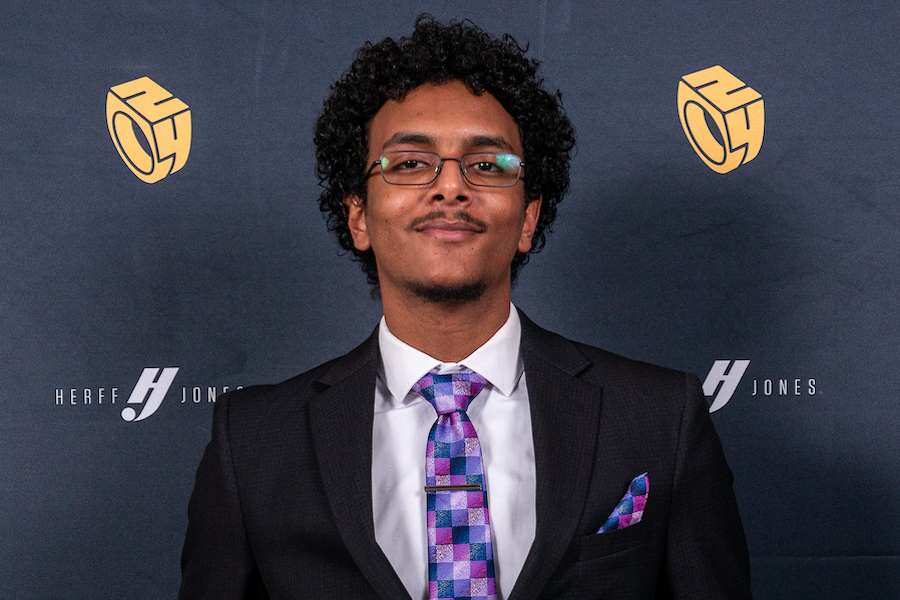Mohamed Magdi Taha, an undergraduate student in Course 6-9 (Computation and Cognition) passed away in August. A native of California and Khartoum, Sudan, the rising junior and New Vassar resident was passionate about social justice issues, had deep love for his home country and family, and had a penchant for writing and studying poetry.
Writing on an Instagram thread for members of the MIT class of 2024, he described himself with wit and humor: “I was born in California but I'm from Khartoum, Sudan, a country in North Africa with rich Nubian origins (we have more pyramids than Egypt js). Last year we as a people overthrew a 30-year-long dictatorship so it goes without saying that I'm proud of where I come from. 🇸🇩 ❤️ Some quick facts bout me: my music taste is as diverse as it gets and I'm always blasting something lmao … My favorite sport is soccer (we call it football in Sudan) I'm always ready to have a quick game.”
Taha was, indeed, proud of his origins and brought his whole self to campus. “While at MIT, he formed close ties to Boston's Sudanese community, speaking at rallies for freedom, peace, and justice at a time of political and social turmoil in Sudan,” MIT President L. Rafael Reif wrote in a letter to the MIT community.
Reem Agil, a graduate student at the Harvard Graduate School of Education who knew Taha as a student at Khartoum International Community School, posted, “I can't express how brilliant he was,” and expressed that she would miss his unflappable spirit: “I'll miss your hearty laugh, your unrelenting faith that things will work out in the end, your love for your country, your kindness and respect for others.”
He was also deeply committed to his family, and they all recalled his sense of joy and devotion to lifting up everyone he encountered. His father, Magdi, says his son “was a deep thinker and he loved a good challenge.” He calls him “courageous” and “kind” and noted his dedication for helping others in both big and small ways. “He didn’t see himself in the equation. All he saw was how he could help.”
His sister Leena says her brother was “her pillar,” and his sister Sara says he “was such a pure soul” and that “he held such a grand space, everywhere he went.” His sister Summer offered her reflections in the form of a poem: “You enlightened us with the never ending light within you / and I hope the angels hold you as tight as I wish to / I hope they shower you with love / Love that I couldn’t give you / Who would’ve known that your future / Would be as bright as paradise?”
His mother, Rihab, echoes that sentiment, saying he was “filled with compassion, love, and joy” and was “generous” and always eager to share “everything he had: his words, his smile, his laughter.”
On and around campus, Taha made a difference with his fellow classmates, helping with homework and with the simple act of picking out the best gifts for others. Classmate Zoe Kuhlken says that she and Taha were kindred spirits. She credits him for getting her through her first few years at MIT. “Some of my favorite moments with Mohamed, believe it or not, were when we were studying the night before exams” and in his encouragement when a test didn’t go as well as either of them hoped. “He always knew how to comfort people,” she adds, and to understand what they needed. “Mohamed was such a good gift-giver because he always knew what would make people happy.”
Academically, he was multifaceted and had a particular passion for poetry. Professor Mary Fuller of the MIT Literature Section shared a series of emails from Taha in which he was asking to get into her filled literature class. While she didn’t let him in (as it was too late into the semester), she did provide some mentorship and feedback on a poem he shared, a spin on Shakespeare’s famed Sonnet 18: Shall I compare thee to a summer’s day?
“Shall I compare thee to a starry night / Thou art more entrancing and unmoor’d / Heat and light elope in hand to excite / Sit in their absence, a love condemn’d … A truth all but known, one tongues must confess: / The Moon’s realm is thine alone to contest.”
Taha said of his poem that it “started off as a sonnet but it was really kind of infuriating to write. I couldn’t really fit all my ideas into 14 lines so I added another four lines so the overall poem would flow better.” In a similar way, he led a life that was hard to contain in a structured, limited form.
Friend and fellow classmate Kuhlken shares another one of his poems, a meditation that beautifully captured his vivacious spirit in his own words: “Do not misunderstand me love / I do not wish to live forever / I simply want to live in your company / long for you, Love, like summer in the winter / I will never get used to you love / The same way leaves insist on dying come fall, I will never get used to you love / I do not wish to live forever / But I will not breathe unless you tell me to.”
In late September, a Khatma (prayer service), memorial event, and poetry night were all held on campus to honor the life of Taha. A mural dedicated to his life will also be placed on campus. Taha’s family and close friends created a scholarship to honor his legacy of helping others and building community. The scholarship aims to support students who wish to study STEM and/ or the arts in the United States. Anyone may donate to the scholarship fund.






